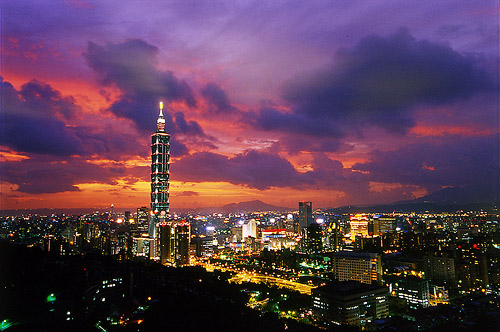By June Chen, a New Yorker
During my several visits to Taiwan in recent years, what impressed me most was the people of Taiwan. Because of the advancements in economy, health and education in past decades, the people in Taiwan in general appear outwardly healthy, well-groomed and tastefully dressed, as well as possess such good qualities as politeness, law-abidance and a love of helping others.

Taipei 101 at night.
| As a New Yorker and a resident in Flushing — the so-called second Chinatown in New York — I come across Chinese people coming from Taiwan, China, Hong Kong, the Philippines, Singapore and other Southeast Asian countries everyday. Both my friends and I in Flushing feel that the Chinese from Taiwan are the best of them and my observations of and experiences with the people in Taiwan have justified the evaluation. |
The first time I took the subway train In Taipei was in my 2010 visit. When I was appreciating the cleanness and coziness of the subway station at University of Taiwan and the lined-up passengers along the waiting line on the ground, I felt my shoulder was gently patted and I turned my head. A young man said to me politely that at subway stations it wasn’t allowed to chew gum, of which I was caught guilty. I thanked him and spat out the gum into a piece of paper. Then it dawned on me that the cleanness of the subway station was partly due to people’s collective willingness to abide by the law and to remind others to do so.
In another trip, when I was taking a taxi from Songshan Airport to the home of one of my relatives in Neihu the taxi driver kindly let me use his cellphone to make calls to my relative. Because I didn’t state the address clearly the taxi driver took a long way to get there. When he found out the mistake he insisted on refunding me NT$50. He also wanted to give me some bananas which his banana-farming relative had brought to him from Southern Taiwan. I took two bananas with great thankfulness.
I had been also deeply touched by the friendliness and hospitality of many other people in Taiwan.
| The other thing that kept amazing me was the weird but kind-of innovatory usage of urban land. It was quite often that I would be walking along a narrow and winding ally in Taipei and then bump into a luxurious high-rise apartment building just about 50 meters later. The structures, which stick out so much are and are so inharmonious with the environmental, gives one a surrealistic sentiment. I couldn’t help but wonder how during construction the giant trucks fully loaded with materials could navigate through these allies. Anyway, they made it. |
The healthy, knowledgeable and hard-working people make a quality labor force for Taiwan to compete and succeed in the global market. Based on my contact with many workers I feel that there is a lot room for Taiwanese workers to increase their mastery of the English language. Just as mentioned in the new book “Some Small Countries Do It Better: Rapid Growth and It’s causes in Singapore, Finland and Ireland,” written by Shahid Yusuf and Kaoru Nabeshima, English as a common working language in the studied countries is one of the factors causing them doing better. The authors said that the English language ability made it easier for workers and citizens of these countries to plug into the global networks and to compete in global market for high value products and services.